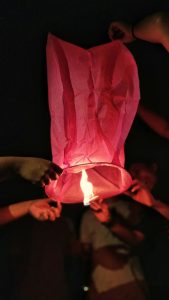 As the new year begins, many of us feel the pull of fresh possibilities—a sense of starting anew, leaving behind what no longer serves, and opening ourselves to what might emerge. Yet, what does it truly mean to encounter the new? Within psychoanalysis, the concept of newness is far from superficial; it is not about resolutions or reinvention in the ordinary sense. Instead, it involves a profound process of becoming. By weaving together insights from Lacan, Winnicott, and Bion, we might reflect on how psychoanalysis can illuminate the nature of newness as we step into the year ahead.
As the new year begins, many of us feel the pull of fresh possibilities—a sense of starting anew, leaving behind what no longer serves, and opening ourselves to what might emerge. Yet, what does it truly mean to encounter the new? Within psychoanalysis, the concept of newness is far from superficial; it is not about resolutions or reinvention in the ordinary sense. Instead, it involves a profound process of becoming. By weaving together insights from Lacan, Winnicott, and Bion, we might reflect on how psychoanalysis can illuminate the nature of newness as we step into the year ahead.
Lacan and Desire
In Lacanian terms, newness is tied to the subject’s relationship with desire—the driving force that moves us towards the unknown, the elusive cause and the unattainable. The new year, often cloaked in fantasies of change and fulfilment, can highlight the gaps between what we think we want and what truly animates us.
Through the lens of Lacan, these gaps are not failures but openings. They invite us to confront the Real—the raw, unsymbolised aspects of experience that resist language yet demand engagement. In the analytic process, as in life, moments of newness may arise when the patient stumbles upon something unexpected in their speech, revealing a truth they did not know they were seeking. The challenge of the new year, then, is not to chase after the ideal but to remain attuned to the unspoken desires that shape our path.
Winnicott and the Potential Space
Winnicott offers a gentler but no less radical view of newness. For him, the capacity to create, to play, and to explore is fundamental to psychological health. The new year, with its rituals and traditions, can serve as a kind of potential space—a Winnicottian arena where the inner world meets the outer, allowing us to imagine and experiment with new ways of being.
In therapy, as in life, this creative space depends on a sense of safety and holding. The analyst, like the new year itself, offers an environment where the patient can tentatively explore the unknown. Yet, this exploration is not a blank slate; it carries traces of the past, which must be negotiated rather than erased. Newness emerges, not as an escape from what was but as a reconfiguration of it—a weaving together of continuity and change.
 Bion and the Face of the Unknown
Bion and the Face of the Unknown
For Bion, the essence of newness lies in our capacity to think the unthinkable. The new year, often heralded as a time of clarity and direction, can also provoke uncertainty, anxiety, and confrontation with what we do not yet know. Bion’s concept of “thoughts without a thinker” reminds us that these raw, unprocessed elements of experience are not obstacles but opportunities.
In analysis, the emergence of newness involves tolerating periods of confusion and “not knowing” as essential steps towards transformation. The same holds true in life: the resolutions we make and the goals we set are meaningful only to the extent that they arise from a genuine encounter with ourselves, one that includes the messiness of our inner world.
 Newness in the New Year, a Psychoanalytic Convergence
Newness in the New Year, a Psychoanalytic Convergence
Viewed through the perspectives of Lacan, Winnicott, and Bion, the new year is not merely a moment in time but a process—a space where desire, creativity, and thought converge. Lacan teaches us to embrace the gaps and ruptures in our narratives as opportunities to discover something new in ourselves. Winnicott reminds us of the importance of play and potential space in reimagining ourselves. Bion invites us to sit with the discomfort of the unknown, trusting that something meaningful will emerge if we can bear it.
As we step into the year ahead, these psychoanalytic insights may guide us in more profound ways than any resolution ever could. Instead of striving to “fix” or “improve” ourselves, we might ask: How can I remain open to what I do not yet know about myself? How can I create space for the unexpected? And how can I use this year as an opportunity not to escape the past but to think it anew?
Perhaps the true gift of the new year is not a promise of change but the invitation to keep encountering ourselves—and the world—with fresh eyes. In this, the work of psychoanalysis and the passage of time share a common aim. Not to guarantee progress but to open the possibility of becoming.
